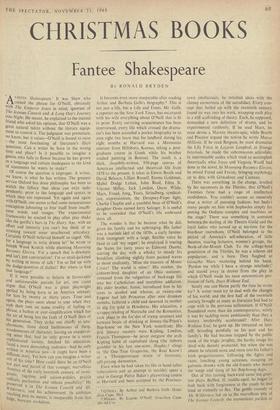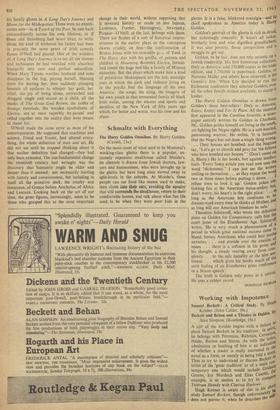CHRISTMAS BOOKS
Fantee Shakespeare
BY RONALD BRYDEN
AFANTEE Shakespeare.' It was Shaw who coined the phrase for O'Neill, obviously with The Emperor Jones in mind, ignorant of The Iceman Cotneth and A Long Day's Journey into Night. He meant, he explained to the mutual friend who asked his opinion, that O'Neill was a great natural talent without the literary equip- ment to control it. The judgment was premature, we know, but it raises—O'Neill is bound to raise ---the most fascinating of literature's illicit questions. Can a writer be born in the wrong time and place? Is it possible to imagine a genius who fails to flower because he has grown in a language and culture inadequate to the kind of statements he wants to make?
Of course the question is improper. A writer, we know, is what he has written. The greatest service Oxford has done philosophy has been to scotch the fallacy that ideas can exist inde- Pendently, prior to the language and syntax in which they are expressed. Yet again and again with O'Neil] one seems to feel some mountainous conception labouring to free itself from insuffi- cient words and images. The experimental frameworks he erected in play after play shake like the gorilla's bars in The Hairy Ape, with an effort and intensity you can't but think of as straining toward some unachieved articulacy. Certainly O'Neill believed himself so caged. 'Oh, for a language to write drama in!' he wrote to Joseph Wood Krutch while planning Mourning Becomes Electra. 'For a speech that is dramatic and isn't just conversation! I'm so strait-jacketed by writing in terms of talk! I'm so fed up with the dodge-question of dialect! But where to find that language?'
If it were possible to believe in favourable and unfavourable periods for art, one could argue that O'Neill was a great playwright spoiled by being born in an America unready for him by twenty or thirty years. Time and again, the plays seem about to soar when they stub their toes on some crudity of feeling or phrase, a bathos or over-simplification which has the air of being less the fault of O'Neill than of his generation. They strike one chiefly as ana- 9hronisms, those dated feeblenesses of slang, woodennesses of character, leaving an exasperat- ing sense that had he only grown in a more sophisticated society, finished his education, faced a more demanding audience—had he only written in America now—it might have been a different story. Yet how can you imagine a writer out of his time? How could therc be an O'Neill not part and parcel of that younger, marvellous America of the early twentieth century, of immi- grants, rag-time and saloon-politics, prairie radicals, puritanism and infinite possibility? He preserved it in The Iceman Cometh and Ah, Wilderness, and his achievement, its ambition reaching past its means, is inseparable from that huge, buoyant evolution.
It becomes even more inseparable after reading Arthur and Barbara _Gelb's biography.* This is not just a life, but a Life and Times. Mr. Gelb, a reporter on the New York Times, has excavated with his wife everything about O'Neill that is fit to print. Every surviving acquaintance has been interviewed, every life which crossed the drama- tist's has been accorded a pocket biography in its own right (we learn that his landlord during his eight months at Harvard was a Mennonite minister from Hillsboro, Kansas, taking a post- graduate course in Greek while his brother studied painting in Boston). The result is a thick, thumbily-written, 950-page canvas of American intellectual and theatrical life from 1870 to the present. It takes in Edwin Booth and David Belasco, Lillian Russell, Emma Goldman, Mabel Dodge Luhan, John Reed, Edna St. Vincent Millay, Jack London, Oscar Wilde, Marx, Freud, Jung, Yeats, Strindberg, syndical- ism, expressionism, the Dempsey-Firpo fight, Charlie Chaplin and a youthful beau of O'Neill's daughter Oona named Jerry Salinger. It is useful to be reminded that O'Neill's life embraced them all The wonder is that he became what he did, given his family and his upbringing. His father was a matinee idol of the 1870s, a curly famine- Irish immigrant with a large, flexible voice he liked to call 'my organ'; he employed it touring the States for forty years as Edmond Dantes, starting the day with a whisky to steady his breakfast, climbing nightly from painted waves to shout exultantly, 'Mine the treasure of Monte Cristo! The world is mine!' His mother, the convent-bred daughter of an Ohio stationer, retreated from the vulgarities of backstage life into her Catholicism and morphine addiction. His elder brother, Jamie, introduced him in his teens to alcohol and whores; at twenty-one Eugene had left Princeton after nine drunken months, fathered a child and deserted its mother to dig for gold in Honduras. His education, a scrappy reading of Nietzsche and the Romantics, took place in the foc'sles of tramp steamers and between bouts of drinking at Jimmy-the-Priest's flop-house on the New York waterfront. His first literary masters were Kipling, London, Francis Thompson—he never outgrew the arch Kipling habit of capitalised slang (the tinhorn gambler in his last one-acter, Hughie,t clings to 'the One True Grapevine, the Real Know') or a Thompsonesque strain of histrionic, self-pitying dxmonism. Even when he had taken his life in hand (after tuberculosis and an attempt at suicide), spent a year in George Pierce Baker's playwriting course at Harvard and been accepted by the Province- ---
* O'NEILL. By Arthur and Barbara Gelb. (Jona-
than Cape. 50s.)
1- Flucmit,. By Eugene O'Neill. (Jonathan Cape,
6d.) town intellectuals, he wrestled ideas with the clumsy earnestness of the autodidact. Every con- cept that boiled up with the twentieth century found its way into his work, wrapping each play in a stiff scaffolding of theory. Each, he supposed, demanded a new definition of drama, and he experimented ruthlessly. If he read Marx, he must devise a Marxist theatre-epic; while Brecht and Piscator argued the notion he wrote Marco Millions. If he read Bergson, he must dramatise the Life Force in Lazarus Laughed; in Strange Interlude, he made the subconscious articulate, in interminable asides which tried to accomplish theatrically what Joyce and Virginia Woolf had done in the novel. In Mourning Becomes Electra, he mixed Freud and Frazer, bringing mythology up to date with Giraudoux and Cocteau.
There was something in the charge, levelled by his successors in the Thirties, that O'Neill's Twenties fame had a tinge of intellectual, modishness. You couldn't accuse so massively dour a writer of pursuing fashion; but hadn't many people set him with Sophocles simply for putting the Oedipus complex and machines on the stage? There was something in common between the darling of the Theatre Guild and the loyal ladies who turned up at tea-time for the five-hour marathons. O'Neill belonged to the period of America's self-education, of little theatres, touring lecturers, women's groups, the Book-of-the-Month Club. To the college-bred generation of the Thirties, he was a solemn old populariser, and a bore. They raughed at Grouch() Marx muttering behind his hand, Pardon me while 1 have a strange interlude!,' and stayed away in droves from the play in which O'Neill made his most ceremonious pro- fession'of faith, Days Without End.
Surely one can blame partly the time he wrote for? A writer must try to deal with the changes of his world, and the first half of the twentieth century brought as many as literature had had to cope with in the previous millennium. If O'Neill floundered more than his contemporaries, surely it was by tackling more ambitiously than they a history intolerably accelerated? After Days Without End, he gave up. He retreated on him- self, brooding painfully on his past and his family's. He had become trapped by the public mask of the tragic prophet, the bardic image his third wife fiercely protected; but when she was absent he relaxed more and more into his father's Irish gregariousness, following the fights and races, lunching young actresses, escaping on galvanic drunks with the old friends who shared the songs and slang of his flop-house days. Out of this turning backward came the great, late plays. Baffled, ill, middle-aged, he began to look back with forgiveness at the youth he had tried so violently to flee. The gentle comedy of Ah, Wilderness led on to the marvellous pity of The Iceman Cometh, the tremendous pardon of his family ghosts in A Long Day's Journey and Moon for the Misbegotten. There were no experi- ments now—in A Touch of the Poet, he cast back extraordinarily across his own lifetime, as if 4bsen and Strindberg had never lived, to write about the kind of Irishman his father had been in precisely the same genre of Irish comedy James O'Neill had played. One of the wonders of A Long Day's Journey is to see all the themes and techniques he had wrestled with absorbed tranquilly into sure and perfect naturalism. When Mary Tyrone watches husband and sons disappear in the fog, pitying herself, blaming them for leaving her, then suddenly plunging beneath all surfaces to whisper her guilt, her relief, the joy of being alone, unwatched and drugged, single and secure as a child, all the masks of The Great God Brown, the asides of Strange Interlude, the wooden symbolisms of Electra, are at once superbly by-passed and rolled together into the reality they were meant to stand for.
O'Neill made the same error as most of his contemporaries. He supposed that machines and science, Freud and Frazer, had altered every- thing, the whole definition of man and art. He did not see until he stopped thinking about it that neither definition had changed—they had only been extended. The one fundamental change the twentieth century had wrought was the discovery that humanity might be older and deeper than it seemed: not necessarily starting with history and consciousness, but including in itself all the primitive dark, the cruelty and innocence, of Greece before Aeschylus, of Africa and Lascaux. Looking back on the art of our time, the great figures, increasingly, seem to be those who grasped this as the most important
change in their world, without supposing that it reversed history or made us less human, Lawrence, Forster, Hemingway, Stravinsky, Picasso—O'Neill, at the last, belongs with them. There are flashes of a sort of historical impres- siveness in the earlier plays as the conception dawns crudely on him—the confrontation of Brutus Jones with his crocodile go.l. of Yank in The Hairy Ape with his gorilla, of parents and children in Mourning Becomes Electra, formal- ised round the huge bed like a family of Minoan statuettes. But the plays which make him a kind of primitivist Shakespeare are the last, nostalgic ones in which the dark and violence living on in the psyche find the language of his own America: the songs, the slang, the imagery of his own youth in that tormented family of black Irish exiles, among the whores and sports and derelicts of the New York of fifty years ago which, for better and worse, was his time and his place.











































































 Previous page
Previous page